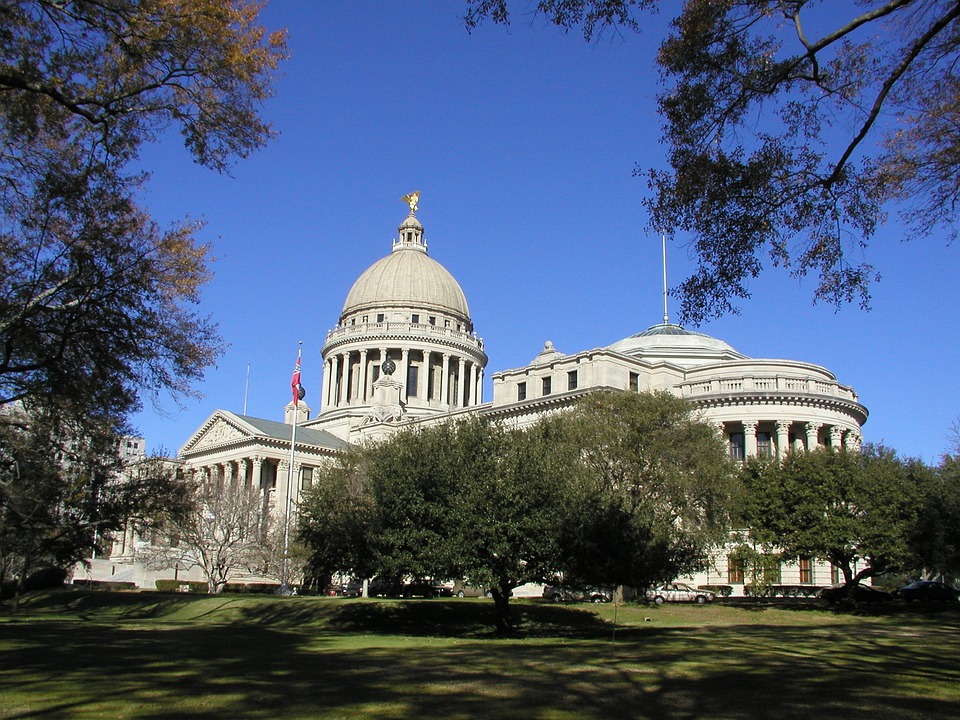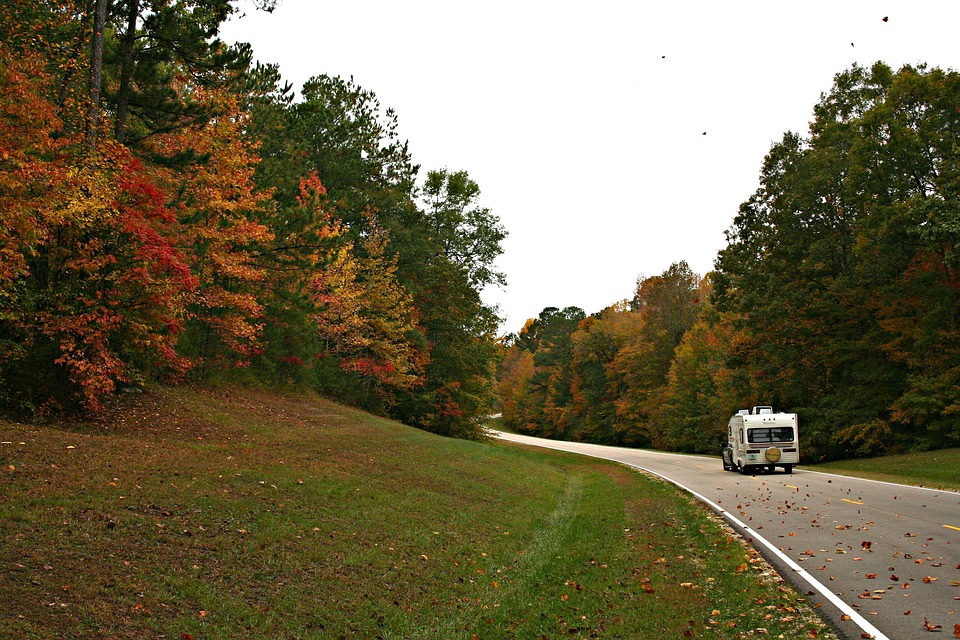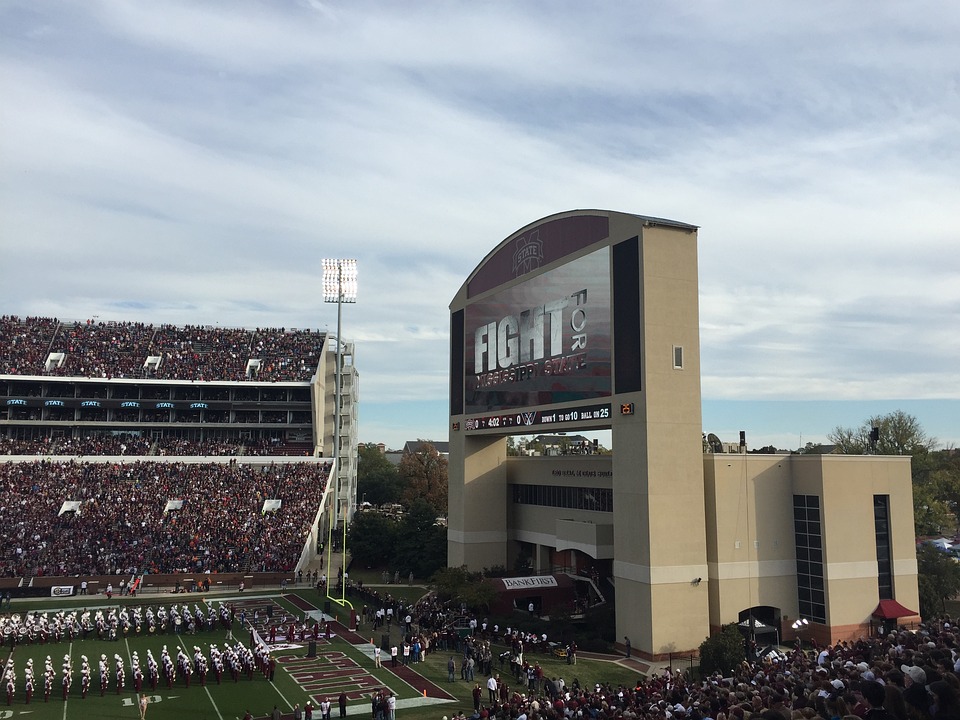Mississippi State (USA)

Location
Mississippi is located in the southern part of the United States, bordered by Tennessee to the north, Alabama to the east, Louisiana to the west, and Arkansas to the northwest. The state’s southern edge lies along the Gulf of Mexico.
Named after the Mississippi River, which forms much of its western boundary, the state’s capital and largest city is Jackson.
Covering around 125,000 km², Mississippi is a mid-sized state rich in natural resources, including rivers and forests.
Climate and Landscape
Mississippi has a subtropical climate, characterized by warm, humid summers and mild winters. Average summer temperatures range from +27°C to +35°C, with humidity often making it feel warmer. Winter temperatures range between +5°C and +15°C, though occasional night frosts do occur. The state receives ample rainfall year-round, especially in the southern and eastern regions.
Mississippi is also prone to severe storms and even hurricanes, particularly in coastal areas along the Gulf of Mexico. The landscape is largely flat, with moderate hills in the north and dense forests in the southwest. The Mississippi River provides fertile plains for agriculture and adds to the region’s scenic beauty.

Population
Mississippi has a population of around 3 million, with racial demographics as follows: approximately 59% are white, about 38% are African American, 2% are Hispanic, and the remainder represents other racial groups. The substantial African American community makes Mississippi one of the most racially diverse states in the U.S., particularly evident in the state’s larger cities.
Main Cities and Population:
- Jackson — The state capital and largest city, with around 160,000 residents. Jackson serves as a cultural center with several universities and a significant African American population.
- Gulfport — The second-largest city, with about 71,000 residents, where the white population makes up over 60%.
- Hattiesburg — A city with approximately 45,000 residents, known for its university and a sizable African American community.
- Biloxi — A coastal resort city with around 50,000 residents, predominantly white but also with a notable presence of other racial groups, including Hispanics.
Crime
Mississippi has one of the highest crime rates in the United States, ranking 4th nationwide. Statistics show approximately 290 violent crimes per 100,000 residents. The crime rate is especially high in major cities such as Jackson, where incidents of robbery, assault, and drug trafficking are frequently reported. Property crime rates, including theft and vandalism, also remain elevated, which necessitates constant monitoring by local police.
In rural areas, the crime rate is generally lower; however, certain regions can still be risky, largely due to economic challenges and limited funding for local security services. In response, Mississippi’s government has been implementing programs to improve safety and supports youth initiatives to reduce crime rates.
Economy
Mississippi’s economic situation has unique challenges, as it remains one of the poorest states in the U.S., with a poverty rate of around 20%. Employment levels are lower than the national average, which impacts the state’s economic growth. Major employment sectors include agriculture, forestry, light industry, and services, especially tourism along the coast.
The minimum wage in Mississippi is $7.25 per hour.
This rate is among the lowest in the country and does not provide sufficient income for many families. Although the issue is frequently debated in the state government, there are currently no plans to raise the minimum wage above the federal rate.

Mississippi for Business
Mississippi offers favorable business conditions with moderate tax rates and numerous entrepreneur support programs. Several industrial parks, especially in Jackson, Gulfport, and Hattiesburg, attract business investments, making Mississippi an attractive location for opening enterprises across sectors due to lower land and building rental costs.
Major Companies in Mississippi:
- Ingalls Shipbuilding — the largest employer in the state, building ships for the U.S. Navy.
- Peavey Electronics — a renowned producer of musical instruments and equipment.
- Cal-Maine Foods — one of the nation’s leading egg producers, headquartered in Jackson.
- Nissan North America — a large automotive manufacturing plant employing thousands locally.
Tax Conditions Mississippi is known for its flexible tax policies, including:
- Corporate income tax — set at 5%.
- Sales tax — 7%, which is relatively moderate compared to other states.
- Additional incentives — tax credits, exemptions for small businesses, and property tax relief for industrial facilities in certain regions.
Advantages of Doing Business in Mississippi:
- Low operating costs — rent, labor, and utility expenses are significantly lower than in many other states.
- Local government support — the state government offers various programs for business growth, including grants and preferential financing.
- Flexible tax system — designed to attract investors and new businesses.
Drawbacks and Risks of Doing Business:
- High poverty rate and low purchasing power — which can impact demand for goods and services in local markets.
- Lack of skilled workforce — finding qualified professionals can be challenging due to lower educational levels.
- Dependence on the agricultural sector — the state economy is heavily tied to agriculture, creating risks in cases of natural disasters or shifts in commodity pricing.
Real Estate
The real estate market in Mississippi is quite affordable compared to many other states. In 2023, the average home price in the state was around $150,000, significantly lower than the national average. Rental prices are also moderate, particularly outside major cities. For example, renting a one-bedroom apartment in Jackson averages between $700-$900 per month, while in coastal cities like Biloxi, rental prices can reach $1,200 depending on proximity to the ocean.
Popular Cities for Living:
- Jackson — The capital and largest city in the state, with an average home price of about $130,000.
- Biloxi — A coastal city with a well-developed tourist infrastructure, with an average home price around $170,000.
- Hattiesburg — Known for its pleasant climate, with an average home price of about $145,000.
Ecology
Mississippi is known for its scenic nature, dense forests, large rivers, and coastal areas along the Gulf of Mexico. The state’s rich biodiversity includes swamps, pine forests, and picturesque waterways. However, ecological challenges are also prevalent in the region, especially with industrial emissions and seasonal hurricanes that impact the coast and local ecosystems.
One of the primary environmental concerns for Mississippi is the risk of air and water pollution. Agriculture and industry often affect water quality in rivers like the Mississippi and Pearl, due to pesticide and chemical runoff. Additionally, the state’s coastal areas are dotted with numerous oil rigs, increasing the risk of oil spills and potential ocean pollution, especially during hurricanes.
Landmarks
Mississippi is known for its cultural and natural heritage, attracting tourists from all over. The state offers historical sites, scenic parks, beaches, and museums that showcase its unique history.
- Mississippi River National Park. Stretching along the legendary Mississippi River, this park is popular among nature enthusiasts. Visitors can enjoy hiking and biking trails, go fishing, or organize a picnic outdoors. The park’s scenic views provide a chance to see local wildlife and experience the true atmosphere of the South.
- Civil Rights Museum in Jackson. This key cultural site highlights the history of human rights struggles in the U.S. and Mississippi’s role in the civil rights movement. The museum offers interactive exhibits, archives, and documentaries, making it essential for those wanting a deeper understanding of social changes in America.
- Natchez Trace Parkway. This scenic route connects Natchez to Nashville and is a favorite among tourists. Originally used by Native Americans, it now attracts visitors with its landscapes, picnic areas, and numerous historical stops. Along the route, visitors can also see historic plantations that reflect the architecture and lifestyle of the Old South.
- Biloxi Beach. The sandy beach in Biloxi offers various attractions for tourists. Restaurants, casinos, and entertainment centers line the beach. Known for its seafood, water sports, and scenic views of the Gulf of Mexico, Biloxi Beach attracts both family vacationers and gambling enthusiasts.
- Historic Buildings in Vicksburg. The city of Vicksburg is famous for its 19th-century architecture and Civil War monuments. The Vicksburg National Military Park commemorates the Battle of Vicksburg and Civil War events. Strolling through the historic streets of the city offers a glimpse into the past with well-preserved buildings and museums.
Why People Move to Mississippi
Mississippi attracts new residents for several reasons, including the low cost of living, affordable real estate, and warm climate. One of the main advantages is the availability of affordable housing. Average property and rental prices are among the lowest in the nation, allowing many families and young professionals to find comfortable, affordable homes. Additionally, low property taxes and rental costs make long-term housing or rental investments advantageous.
The favorable climate draws those seeking to avoid harsh winters. Mississippi offers mild winters and warm summers, providing a comfortable environment for people looking for better weather. Many are also attracted by the natural beauty and recreational opportunities on the Gulf Coast, where they can enjoy beach activities and water sports.
The social environment in Mississippi is generally calm and relaxed. For many families and retirees, the state seems like an ideal place for a comfortable lifestyle, thanks to a slower pace of life, traditional values, and local hospitality. Most cities have well-developed social infrastructure and educational facilities, making it appealing to families with children.
However, life in Mississippi has its downsides. While the cost of living is low, wages remain relatively modest, and career opportunities are limited compared to larger economic centers. A lack of highly skilled jobs and fewer employment options for specialized professionals can pose challenges for younger workers. Additionally, the risks of natural disasters, such as hurricanes, are a factor to consider for those looking to settle along the coast.
Table of Contents